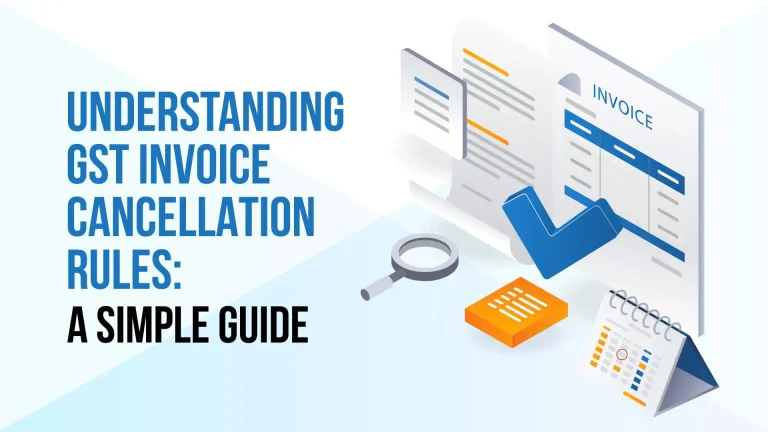The Goods and Services Tax (GST) has brought big changes to how taxes work in India since it started in July 2017. Businesses have to follow GST rules, which includes dealing with invoices. But sometimes, they need to cancel an invoice. That’s where GST invoice cancellation rules come in. In this guide, we’ll explain everything about these rules—why they’re important, how they work, and what they mean for businesses. Let’s dive in and learn more about it.
Why GST Invoice Cancellation Rules are Important
Before we get into the nitty-gritty details of these rules, it’s super important to grasp why they matter so much in the GST system. In the busy world of business, things change all the time. Transactions can have mistakes, arguments might happen, or sometimes deals just fall through. When these things occur, being able to cancel invoices correctly and following GST rules becomes really, really important. If a business messes up here, they could face fines or even legal trouble. So, it’s like a safety net to make sure everything stays fair and square.
Overview of GST Invoice Cancellation Rules
GST invoice cancellation rules outline the steps and conditions for cancelling invoices within the GST system. These rules are set by the government to make sure that invoicing is clear, correct, and legal. It’s really important for businesses to follow these rules carefully to prevent mistakes or breaking the law. Making sure invoices are cancelled correctly helps keep everything fair and transparent for everyone involved.
Procedure for Cancelling GST Invoices
The procedure for cancelling GST invoices involves several important steps that need to be followed carefully to make sure you’re following the GST law correctly. First, you need to figure out why you need to cancel the invoice. It could be because there was a mistake, the transaction didn’t happen, or there’s a disagreement. Once you know why, you have to start the cancellation process within the time given by the GST law.
In the GST system, you can cancel invoices within a certain time from when you issued them, but there are rules you have to follow. It’s really important to stick to these rules to avoid getting in trouble. Also, when you cancel an invoice, you have to give the person you sent it to a credit note. This note explains why the invoice was cancelled and gives all the details of the cancelled invoice.
Implications of GST Invoice Cancellation
The cancellation of GST invoices affects both the seller and the buyer. For businesses to follow the rules properly, they must accurately record any cancelled invoices in their GST returns. This is crucial because mistakes in reporting could lead to tax issues and possibly even audits by tax authorities.
Moreover, cancelling invoices can impact the input tax credit (ITC) that the buyer claimed on the goods or services. According to GST rules, the buyer must reverse the ITC they claimed on the cancelled invoice and adjust their tax credit ledger accordingly. This is to make sure the buyer doesn’t get benefits or credits for transactions that are cancelled or voided. It’s important for both parties to understand and follow these rules to avoid any problems with their taxes.
GST Invoice Cancellation Rules:
Here are the rules of cancellation of GST invoices:
- Time Limit: According to GST laws, there’s a set time within which you can cancel an invoice. Usually, you can cancel it during the same financial year it was issued or before filing the September return of the next financial year, whichever comes first.
- Valid Reason: You can only cancel an invoice for reasons accepted under GST rules. These reasons often include mistakes in the invoice, like wrong details or tax amounts, transactions that didn’t happen, or arguments between the parties involved.
- Credit Note Issuance: When you cancel an invoice, you have to give the other person a credit note. This note confirms the cancellation and mentions things like the original invoice number, date, and why it was cancelled.
- Adjustment of Input Tax Credit (ITC): When you get the credit note for a cancelled invoice, you need to adjust the tax credit you claimed on the original invoice. This makes sure you’re not getting tax benefits for transactions that are no longer valid.
- Tax Reporting: Businesses must accurately report cancelled invoices in their GST returns. This means showing the right amount of tax owed and giving details of the cancelled invoices in the tax forms or filings.
- Communication: Both the seller and the buyer need to talk properly about cancelling invoices. This includes telling each other about the cancellation on time, giving the right documents like credit notes, and updating records correctly.
- Compliance: Following GST invoice cancellation rules is a must to avoid fines or other problems with the law. If you don’t follow the rules, you might get fined, checked by tax people, or face other actions from authorities.
- Documentation: Every part of cancelling invoices, like giving out credit notes and changing tax credits, must be written down properly. This helps in the future if there’s any need to check or confirm what happened.
By sticking to these rules, businesses can keep things clear, correct, and legal when they cancel invoices under GST. It’s super important for businesses to know about any changes or updates in GST rules about invoice cancellation to stay on the right side of the law.
Also Read:
- What Details Must be Included in a Sale Bill with GST?Getting your GST paperwork wrong feels like walking through a minefield, doesn’t it? One missing detail on your invoices, and suddenly you’re dealing with compliance headaches that could’ve been easily avoided. Creating a proper Sale Bill with GST isn’t rocket… Read more: What Details Must be Included in a Sale Bill with GST?
- How Is a Purchase Bill with GST Different from a Sales Invoice?Running a business in today’s GST-enabled economy requires more than just selling and buying. It’s about being organised, compliant, and aware of what each document in your billing system stands for. One common confusion many businesses face is the difference… Read more: How Is a Purchase Bill with GST Different from a Sales Invoice?
- How Can You Generate a Mobile GST Bill in Seconds?Running a shop is hard enough. But when billing takes forever and GST compliance gets messy, things can slow down. That’s where a Mobile GST Bill comes to the rescue. Whether you run a busy garment store or a local… Read more: How Can You Generate a Mobile GST Bill in Seconds?
- What Happens If GST on Advance Received Is Not Paid on Time?Running a business in India requires keeping pace with ever-evolving tax laws, and GST in advance is one such area that many businesses often overlook sometimes unintentionally. But missing out on timely GST payment on advances can lead to unnecessary… Read more: What Happens If GST on Advance Received Is Not Paid on Time?
Frequently Asked Questions
What is GST invoice cancellation?
GST invoice cancellation is the process of undoing or voiding a previously issued invoice due to errors, disputes, or other valid reasons recognized under GST regulations.
Can I cancel an invoice anytime?
No, invoices can only be cancelled within a specified time period, usually within the same financial year of issuance or before filing the September return of the following financial year.
Why would I need to cancel an invoice?
Invoices may need to be cancelled due to errors in details, incorrect tax amounts, void transactions, or disputes between the parties involved.
Do I need to issue a credit note when cancelling an invoice?
Yes, when cancelling an invoice, a credit note must be issued to the recipient of goods or services, providing details of the cancelled invoice and reasons for cancellation.
How do I adjust Input Tax Credit (ITC) for a cancelled invoice?
Upon receiving the credit note for a cancelled invoice, you must adjust the ITC claimed on the original invoice to ensure compliance with GST regulations.
What happens if I don’t comply with GST invoice cancellation rules?
Non-compliance with GST invoice cancellation rules may lead to penalties, fines, audits, or other enforcement actions by tax authorities.
Do I need to communicate with the recipient when cancelling an invoice?
Yes, effective communication with the recipient is essential when cancelling an invoice, including providing timely notice and issuing necessary documents like credit notes.
How should I document the cancellation of invoices?
All transactions related to the cancellation of invoices, including issuing credit notes and adjusting tax credits, must be properly documented and maintained for future reference and audit purposes.
Can I cancel an invoice if it has already been paid?
Yes, you can cancel an invoice even if it has been paid, but you must issue a credit note to the recipient and make necessary adjustments to tax credits.
Where can I find more information about GST invoice cancellation rules?
You can refer to the official GST guidelines, consult with tax experts, or seek guidance from GST service providers for more information and assistance regarding invoice cancellation rules.





